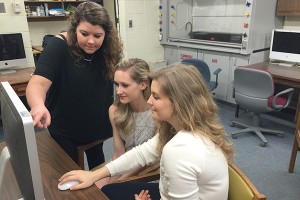
UM chemistry majors (from left) Ashley Williams, Sarah Sutton and Katelyn Allen conduct undergraduate research.
OXFORD, Miss. – The Department of Chemistry and Biochemistry at the University of Mississippi has begun offering two different pathways for students seeking a bachelor’s degree in chemistry.
“Our B.S. in Chemistry degree has been modified to have two tracks for students to choose from,” said Nathan Hammer, associate professor of chemistry and biochemistry. “The first option is a traditional chemistry track that prepares students well for graduate school in chemistry or a career in the chemical industry. The second track has a biochemistry emphasis and is specifically designed for students who wish to go on to medical school or graduate school in biochemistry.”
The department has a suggested four-year course outline with electives that count toward the degree and are required for medical school admissions. These requirements are covered by the Medical College Admission Test, or MCAT. The modified degree went into effect this spring.
“Both tracks are certified by the American Chemical Society and are among the most rigorous in the country,” Hammer said.
By modifying its B.S. in Chemistry degree, the department better serves the growing number of pre-med students who wanted a rigorous bachelor’s degree in the physical sciences, he said. These students typically enjoy chemistry, physics and math, but eventually wish to serve others in a medical profession.
“Prior to modifying our B.S. degree, these students had two options,” Hammer said. “The first was to satisfy our previous B.S. (in) Chemistry degree requirements and then take additional biology and biochemistry classes. The second option was to pursue our B.A. (in) Biochemistry degree and supplement it with calculus-based physics, additional advanced math courses and additional advanced chemistry courses.”
Most students opted to pursue the B.S. degree and take additional biochemistry and biology courses. Creating a B.S. in Chemistry degree track incorporates these additional biochemistry courses as well an advanced biology elective.
“We have substituted these courses for other chemistry courses that are useful for a career in chemistry, but not helpful in preparing for the medical profession,” Hammer said. “We have essentially taken what our best and brightest pre-med students have been doing on their own the last few years and crafted a degree that serves them. We have approximately 20 students total that are pursuing the new B.S. (in) Chemistry degree with the biochemistry emphasis. Most of these are pre-med students associated with the Sally McDonnell Barksdale Honors College.”
As a result of the additional students pursuing a B.S. degree each year, more space is needed for physical chemistry and inorganic chemistry laboratories. Coulter Hall’s new research annex includes a state-of-the-art molecular spectroscopy research lab that will serve CHEM 337 classes. CHEM 402 will be moved to a larger room that will be able to serve the larger number of students each year.
Since students in the new emphasis will be receiving a well-rounded chemistry degree, they will be taking courses in every area of chemistry and will have opportunities to take classes from almost every faculty member in the department, Hammer said.
“In their freshman year, they will take two semesters of general chemistry from Greg Tschumper, Steve Davis, Maurice Eftink, Jason Ritchie, Kerri Scott, Murrell Godfrey, John Wiginton, Jim O’Neal or Gerald Rowland,” Hammer said. “Students will take two semesters of organic chemistry in their sophomore year from Dan Mattern, Jared Delcamp or Davita Watkins.”
They will also take a number of advanced classes, including physical chemistry from Hammer, analytical chemistry from Amal Dass and Jim Cizdziel, biochemistry from Susan Pedigo, Randy Wadkins and Mike Mossing, and inorganic chemistry from Ritchie, Jonah Jurss and Walt Cleland.
“Students will also be required to perform original research with a faculty member in chemistry during their senior year, which could be with any research active faculty member,” Hammer said. “For this reason, this new degree track is especially popular with pre-med honors students who can get senior research credit for their honors thesis.”
Charles Hussey, chair and professor of chemistry and biochemistry, is enthusiastic about having two undergraduate degrees within the department.
“The new Bachelor of Science degree with emphasis in biochemistry is more versatile than our existing Bachelor of Arts degree in biochemistry,” he said. “It not only prepares students to compete for postgraduate opportunities in the pre-health professions, but also provides them with a solid foundation in advanced chemistry. With this foundation, they are well equipped for graduate studies in biochemistry as well as the research-based M.D.-Ph.D. programs offered by elite medical schools.”
For more information about the Department of Chemistry and Biochemistry, visit http://chemistry.olemiss.edu or call 662-915-7301.